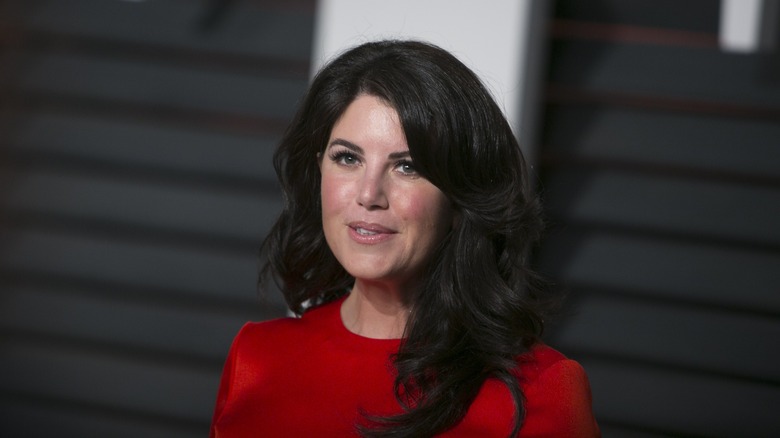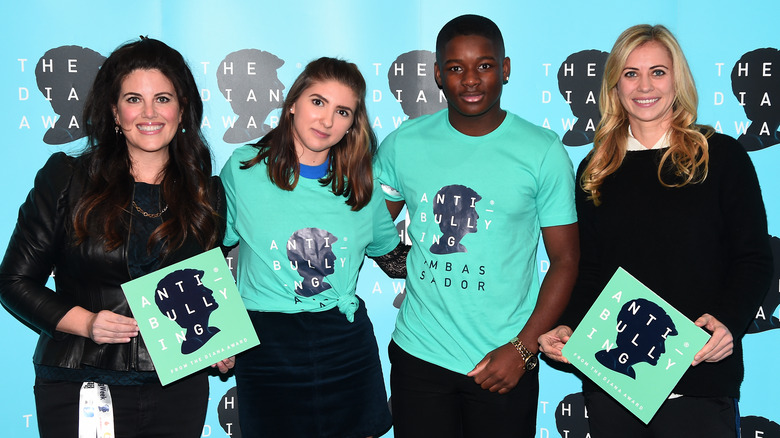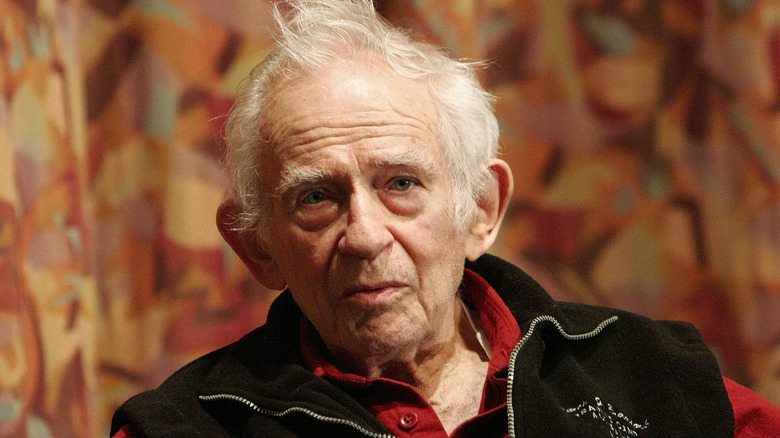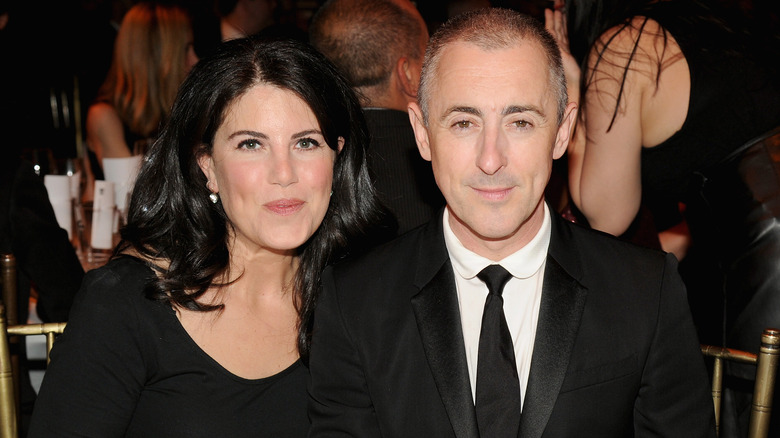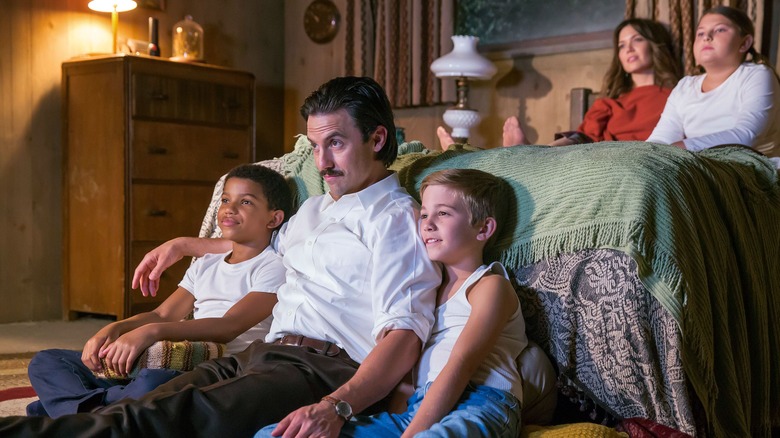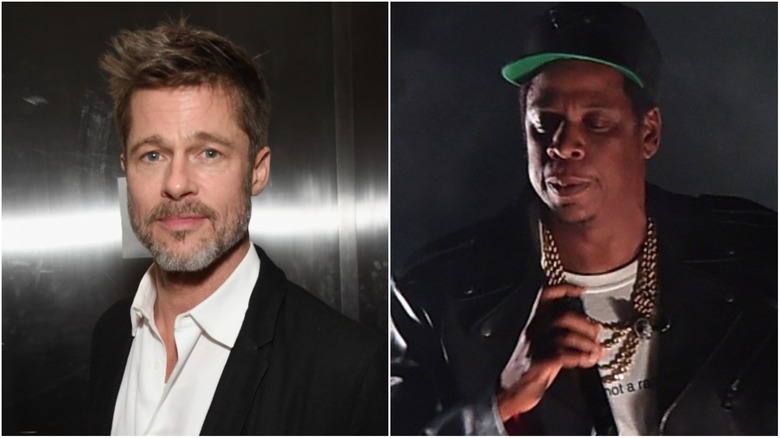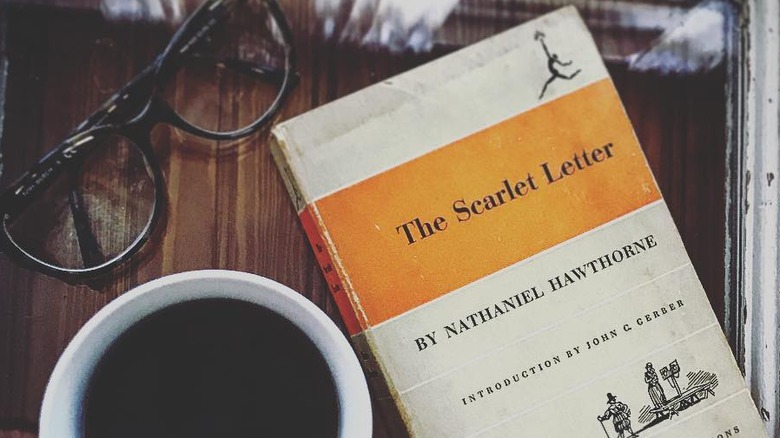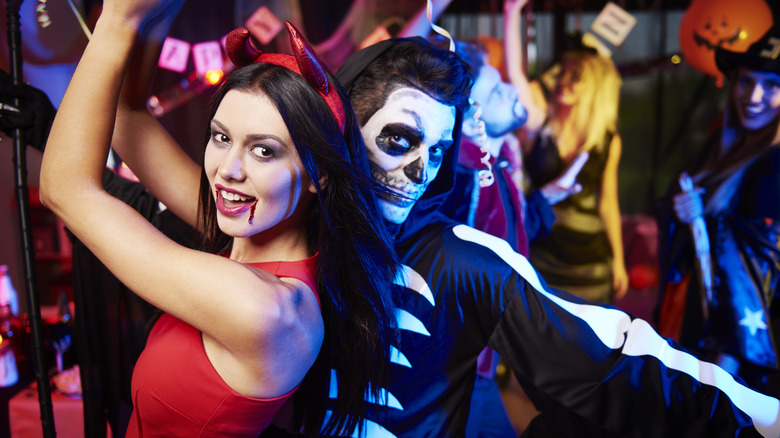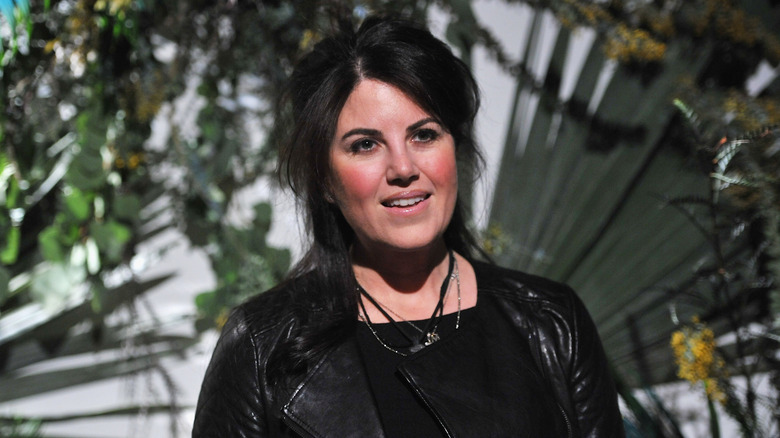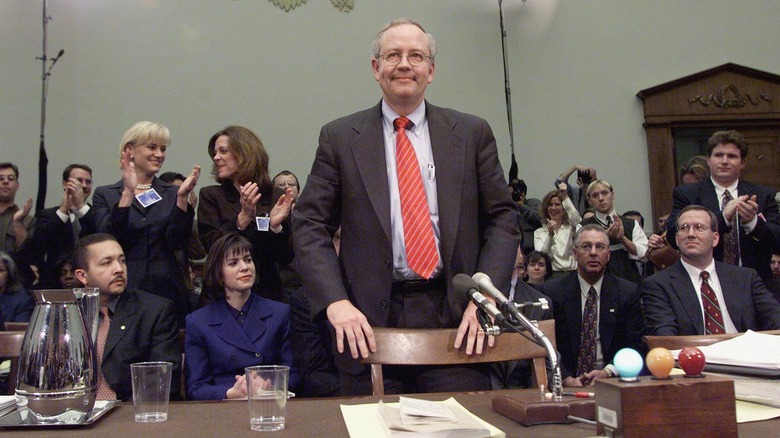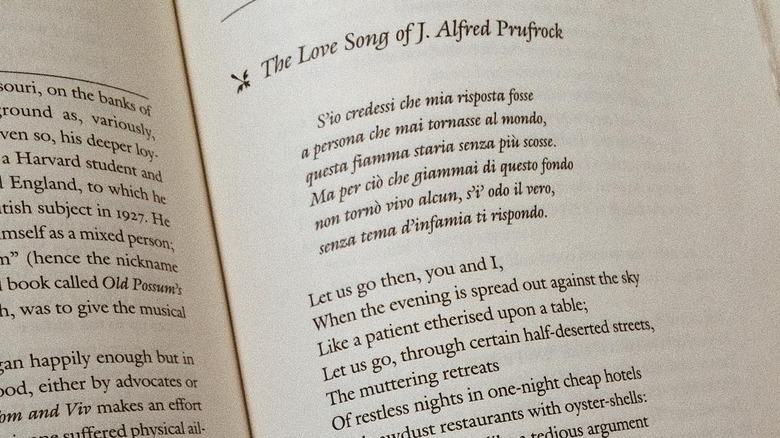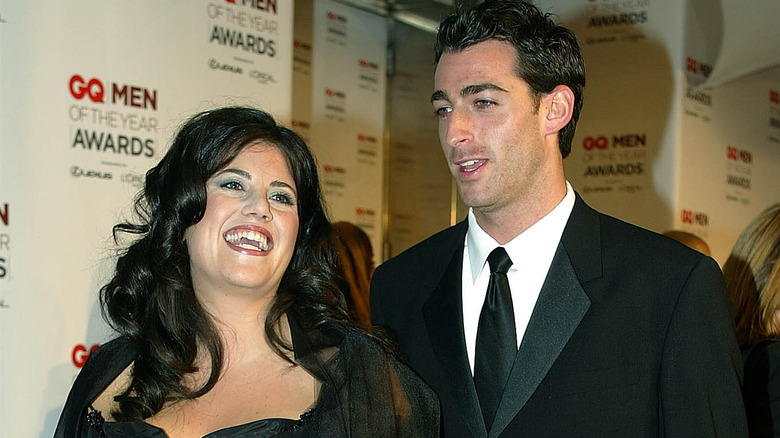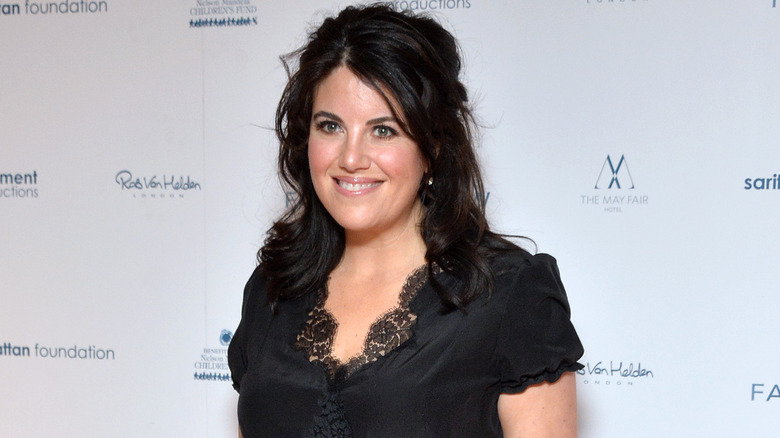The Untold Truth Of Monica Lewinsky
Thanks to an ongoing narrative that began more than 20 years ago, everyone thinks they know who Monica Lewinsky is. Countless unflattering and, often, one-dimensional terms have been ascribed to her: tart, floozy, stalker, that woman. Lewinsky — then a White House intern — was only 22 years old when she became entangled with the 42nd president of the United States in the mid-1990s. The fallout from her affair with President Bill Clinton led to his impeachment, and nearly brought down his administration. Additionally, the relationship and its legacy h as dogged Lewinsky in all the years since. She has since become adept at avoiding the harsh glare of the public spotlight.
Can you imagine what the headlines of your life might be if someone based them off of the mistakes you made in your early twenties? Yikes, right? A bit of investigation proves that the preconceived notions about Lewinsky are reductive at best. Here's what you may not know about the woman who has, in her own words, buried the blue dress and moved forward.
She's become an anti-bullying crusader
Over time, Lewinsky decided to turn the pain of public ostracism into action. According to her Twitter profile, she's a social activist focusing on "bullying prevention." In that capacity, she serves as an ambassador for anti-bullying organizations like Bystander Revolution and the Anti-Bullying Campaign. At public speaking events, she addresses the insidious nature of cyber-bullying, too. In October 2017, she even helped create an anti-bullying emoji keyboard to coincide with the #BeStrong hashtag.
In an August 2016 article in Vanity Fair, Lewinsky discussed the heartbreaking example of a young boy from Brooklyn named Daniel Fitzpatrick. He took his own life after being bullied relentlessly at school. His father described him as "a kind, gentle little soul."
In lamenting this loss, Lewinsky made the salient point that we, as a society, are failing our young people in the face of such extreme — and frequently digital — vitriol. "We need to do more and to do better," she wrote. "We are all bystanders in today's world of bullying — particularly online. We can step in if it feels safe. We can report what we see. We can offer support to targets of bullying, privately or publicly, with words or even anti-bullying emojis."
Pulitzer-prize winner Norman Mailer believed in her
"You got a raw f***ing deal, kid." Those were the first words the late, Pulitzer-prize-winning author Norman Mailer ever uttered to Monica Lewinsky. The brief exchange took place at a bookstore event in 2002, during which Mailer's son Michael introduced the two. That same year, one of Mailer's other sons, writer John Buffalo, invited Lewinsky to a family lunch at the Provincetown, New York home of Norman and his wife Norris — and an unlikely friendship was forged.
"Norman was a force, and Norris was his equal, an elegant counterpoint. She was also an accomplished writer and artist, and we formed a rare, instant bond," Lewinsky recalled in Vanity Fair in December of 2014. Fed by a mutual love of literature, profanity and the magic of every day things like white wine and flea markets, the bond Lewinsky shared with the Mailers grew over time. It would include continued correspondence and "colorful, story-filled" evenings.
It's clear the affection between the Mailers and Lewinsky was mutual. When Random House published Selected Letters of Norman Mailer, a letter the esteemed author sent to Lewinsky (a family dinner invitation, no less) made the cut.
BFF Alan Cumming calls her one of the kindest people ever
A personal endorsement from Norman Mailer is understandably a big deal, and one from Alan Cumming is nothing to scoff at either. Outside of his work on hits like The Good Wife and X-Men 2, the Scottish-American actor is a prominent LGBTQ activist. With the CBS drama Instinct in 2018, he became the first openly gay lead in U.S. network television. And, well, he thinks Monica Lewinsky is "lovely."
During an appearance on Watch What Happens Live with Andy Cohen, a viewer asked Cumming to weigh in on his friendship with Lewinsky. He explained that the two met at a Marie Claire party more than a decade ago, and that they hit it off. "And she really is one of the kindest, most loving, loyal, tender, funny girls I've ever known. I mean, I think she's really one of my best friends," Cumming elaborated.
For her part, it seems Lewinsky turns up to support Cumming whenever she can. In 2014, she told The New York Times Cumming was "one of the most extraordinary people" she knows and someone who radiates "savage joy."
OITNB and This Is Us? Yep, she's a fan too
There are two types of TV virtually no one can resist: shows that are made for binge-watching, and those seemingly created with the sole purpose of making you ugly cry into your rosé each week. Arguably the most popular examples of these are Netflix's Orange Is the New Black and NBC's This Is Us, respectively. And, as if you needed any further proof of their universal appeal, consider the fact that Lewinsky tunes in just like the rest of us.
In July 2014, she confessed in a Vanity Fair article that she'd been spending copious amounts of time curled up on her old red sofa in a summer blanket watching Orange Is the New Black. The show's riveting story lines and emotionally nuanced characters easily transported her "into that cloistered world of raw emotions, human frailties, and power plays," she wrote.
Then, in February 2018, Lewinsky tweeted she was catching up on This Is Us — which she joked was "the Adele of television." There are two conclusions we can draw from this: first, that Lewinsky likely won't go near a slow cooker anytime soon, and second, she has excellent taste in television programming.
She gives props to Jay-Z and Brad Pitt
Lewinsky is no stranger to toxic masculinity. It's become a routine part of her world, being flung at her daily from the dark corners of the internet or, at times, by political pundits. However, Lewinsky is happy to herald the dawn of man's new, more sensitive age. Chronicling the increasing trend toward male vulnerability for Vanity Fair in July 2017, she cited two prime examples from pop culture: former Fight Club-er Brad Pitt and rap mogul Jay-Z, both of whom have evolved from "macho men" into men unafraid to express raw emotion and acknowledge their own mistakes.
Lewinsky wrote: "It is a refreshing and bracing antidote to see male icons convey vulnerability in an age when Washington's new power elite and our coarsening culture are busy projecting an outmoded caricature of manhood, 24/7. As we wrestle with gender roles and relationships between the sexes — and see issues of sexism running rampant from the tech world to politics — it's heartening to see a crack in the implicit contract among men, their emotions, and society at large."
Academics compare her story to The Scarlet Letter
She had an affair with a powerful man in the community. When this affair became evident, she was publicly scorned and ridiculed. Can you guess the woman's identity? If you guessed Lewinsky, you're only half-right. Because while the story describes Monica Lewinsky's ordeal, it also fits Hester Prynne — the ostracized heroine of The Scarlet Letter. In fact, academics have begun to draw direct comparisons between the badge of public reproach worn by these women, one literal and one figurative.
Author Sasha Cagen outright refers to Lewinsky as "the modern day Hester Prynne," noting the striking similarities in their stories. "Just as Hester Prynne was asked to stand on the stage and be shamed for her one 'mistake' and then wear the Scarlet Letter for the rest of her life as a 'living sermon against sin, until the ignominious letter be engraved on her tombstone,' Lewinsky endured the slut-shaming pillory in 1998 when people and even journalists thought nothing of calling her a 'plump tart,' 'tramp,' or yes, 'slut,” Cagen wrote on her website in 2015.
In an academic paper written in 2015, a student named Blake Dean explored the "deficit of empathy" in society that made the ruthless ridicule of Prynne and Lewinsky possible. The phrasing is particularly poignant in light of the fact that Lewinsky, in her 2015 TED talk, put out an impassioned plea for "compassion and empathy" to end internet-shaming culture.
Halloween used to be her favorite holiday (now, not so much)
Halloween... what a fun holiday, huh? It's the one night a year you get to act like a kid again and let your imagination take form. Monica Lewinsky gets it — she, too, admits to being wooed by October 31's irreverent charm. Actually, she revealed in Vanity Fair in 2015 that Halloween was a favorite holiday.
Admittedly, she wrote, she was in it growing up for the candy. Peanut butter cups and Laffy Taffy? Yes, please. In her adult years, though, Lewinsky confesses that any fondness she feels for the spooky holiday is decidedly less sweet — it's the only day of the year people don't outright recognize her and ask, "Are you Monica Lewinsky?" Unfortunately, while part of that anonymity lies in the fact Lewinsky is dressed up on Halloween, it has at times been because she isn't the only Monica Lewinsky out there. Following the Bill Clinton brouhaha, Lewinsky herself unwittingly became a costume.
Referencing Rachel Dolezal and Caitlyn Jenner ensembles, Lewinsky examined in Vanity Fair the idea of Halloween costumes as pointed social commentary. It's a trend, she noted, that "emboldens us and sometimes, sadly, makes us crueler and less civilized than the everyday public personae we project."
There was a time she couldn't even get unpaid work
Given the cliche negative characterization of Lewinsky floating around the internet, it's easy to overlook a defining fact about her: she's highly intelligent. After all, her first job after graduating from college was at the White House. How many people can claim that pedigree? Plus, in the years following her public fallout, she moved to England, where she received a master's degree in social psychology from the London School of Economics. However, landing a job has more often than not proven nearly impossible for Lewinsky.
After graduation, she threw her energy into interviewing for jobs — typically non-profit or organizations with a charitable slant. "Yet, because of what potential employers so tactfully referred to as my 'history,' I was never 'quite right' for the position," she revealed in Vanity Fair in June 2014.
In an interview with The Guardian, Lewinsky said she spent over a decade "floundering." She relied on non-traditional employment, admitting in her Vanity Fair article, "I've managed to get by (barely, at times) with my own projects, usually with start-ups that I have participated in, or with loans from friends and family."
Lewinsky has since reclaimed her narrative and become an ambassador for the anti-bullying movement.
She has faced her demons...including Ken Starr
It was a typically joyous time of year. Lewinsky and her family had made reservations at a restaurant in Manhattan's West Village on Christmas Eve 2017, and were settling in for a cozy evening together when she noticed a familiar face in the crowd. It then dawned on Lewinsky that the man was none other than Ken Starr — the attorney who so tenaciously built a case against Bill Clinton, effectively making Lewinsky's life collateral damage in the process.
She could have avoided Starr altogether, but Lewinsky divulged to Vanity Fair in March 2018 that she decided to approach Starr instead. Although nervous, she told Starr she wished they'd both made different choices back then. And just as boldly as she sidled up to Starr, Lewinsky has publicly professed that she "deeply regret[s]" what transpired between herself and President Clinton.
Lewinsky has had a long time to mull over her past mistakes and no longer tries to hide from them. She credits years of personal-counseling with being in "a place where I now embrace opportunities to move into spaces that allow me to break out of old patterns of retreat or denial."
Who else casually drops Prufrock references?
When Lewinsky was 16 years old, a high-school English class curtailed what was shaping up to be a tumultuous stretch of teen angst. To be more specific, Lewinsky says it was someone she was introduced to in the class that shifted her perspective. That person was T.S. Eliot.
Of course, Lewinsky didn't meet the acclaimed poet in person. Rather, her teacher read one of his most enduring works aloud in class: "The Love Song of J. Alfred Prufrock." In that moment, Lewinsky developed an abiding love for Eliot's work and that one in particular. She revealed this in what essentially amounts to a love letter to the poem that she penned for Vanity Fair in June 2015.
It wasn't the first-time she would allude to the piece (and likely not the last). In her 2014 Vanity Fair article "Shame and Survival," Lewinsky described her decision to return to the public forum with a nod to Eliot. "Perhaps by sharing my story, I reasoned, I might be able to help others in their darkest moments of humiliation," she wrote. "The question became: How do I find and give a purpose to my past? It was my Prufrockian moment: 'Do I dare / Disturb the universe?'"
And you thought your dating life was complicated
Just in case you thought your latest existential crisis over swiping right was the worst, try to imagine diving into the dating pool when your name is Monica Lewinsky. On the surface, it's rough enough — "Yes, that Monica Lewinsky." Then you have to peel back the deeper layers of public scrutiny and ulterior motives.
"With every man I date (yes, I date!), I go through some degree of 1998 whiplash," Lewinsky shared with Vanity Fair readers in 2014. "I need to be extremely circumspect about what it means to be 'public' with someone."
Despite those dating difficulties, Lewinsky has managed to cultivate meaningful relationships over the years. "I've become adept at figuring out when men are interested in me for the wrong reason. Thankfully, those have been few and far between," she said, adding that every man who's been special to her has helped her reclaim another piece of herself. "And so, no matter the heartbreak, tears, or disenchantment, I'll always be grateful to them."
Her singular hope is to be a light to others in darkness
Gearing up for her TED talk in 2015, Lewinsky must have known there would be push-back. From trolls, from misogynists, from politicos — take your pick. Still, she accepted the invitation to speak. In a rare interview with The New York Times just prior to taking the podium, Lewinsky illuminated why.
When Times writer Jessica Bennett pressed Lewinsky about what she hoped to accomplish with the speech, Lewinsky referenced David Foster Wallace's book Brief Interviews With Hideous Men. In it, she proffered, is the story of a young girl who endures horrific abuse but, in enduring it, learns she can survive.
"That's part of what I thought I could contribute," Lewinsky told Bennett. "That in someone else's darkest moment, lodged in their subconscious might be the knowledge that there was someone else who was, at one point in time, the most humiliated person in the world. And that she survived it."
